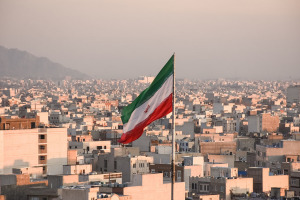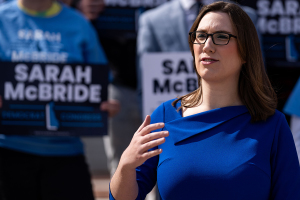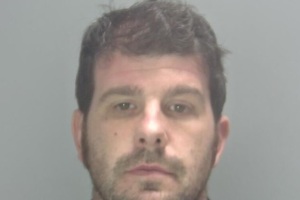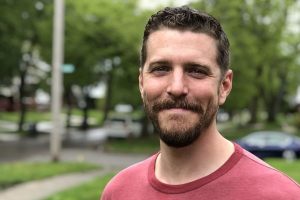9/11: God's Glory Then and Now
There are times in history when God, in His providence, allows people to see in full view the pivoting of history. Patriots assembling in Philadelphia experienced it on July 4, 1776. Navy sailors looking to the westward skies saw it on December 7, 1941. Families listening to their radios heard it on November 22, 1963.
In an instant – the signing of a document, the dropping of a bomb or the firing of a gun – the world suddenly and irreversibly changes. Yet no event in American history quite compares to the morning of September 11, 2001.
Buildings that scraped the floors of heaven crumbled. Planes carrying businessmen, grandmothers, and children plummeted. For thousands, life and all its promises and possibilities ended – some in an instant, others while saving strangers, running up stairs or storming cockpits.
At the end of the day we were left with a different skyline, smoldering ruins and a fear that gripped our hearts. When the smoke and dust from the World Trade Center, the Pentagon, and the grassy fields of Pennsylvania lifted, America was a different nation. When darkness fell on that black day, we were shaken and fearful.
Along with the crumbling of two national symbols of economic prosperity and military power went our assumptions and assurances of what was and is and is to come. History did more than pivot on that day – it spun.
In the immediate aftermath of the worst attack in U.S. history, we saw our nation grappling with two new realities. We still wrestle with them today.
First was the shattered visage of an "invincible America." Second, was a nation trying to make sense of the tragedy and the fears that lingered like the smoke that rose from Ground Zero.
Both realities gave birth, for a time, to new sentiments of national faith and virtue, something that encouraged us as Christians. But without true Christianity – repentance, discipleship, and commitment to truth, - the pendulum eventually swung back, leaving people a bit more moral, a bit more churched, but without the enduring change that comes from a heart and mind transformed by the Gospel.
In the decade leading up to 9/11, America was in the midst of an era of unprecedented ease. Peace and prosperity were assumed to be the nation's new manifest destiny. The 100-hour Gulf War proved American dominance in the world. High-tech college dropouts, armed with laptops and good ideas, were about to revolutionize the world's economies.
On Wall Street, brokers cheered the advancing stock market, and on Capitol Hill, lawmakers were setting the stage for the first budget surpluses in generations. "Help Wanted" signs hung on Main Street stores and Fortune 500 companies offered signing bonuses to college seniors.
While revolutions and civil wars ravaged other nations, America was seen as invincible. We were too progressive, too moderate, too feared to concern ourselves with skirmishes over land and religion. From all accounts, the kinder, gentler America had finally arrived.
Yet, while the seas were calm and the winds were fair, America was all sail and no anchor.
While social indicators – from teenage pregnancy to poverty rates – were dropping steadily, a troubling cultural malady was festering. It surfaced in much publicized stories: a football great charged with murdering his wife, a South Carolina mother drowned her two boys, students opened fire at high schools, the president committed perjury, a doctor ended the lives of suffering patients, homosexuals were allowed to marry in Hawaii, etc.
Many Americans knew the country was on a moral joy ride, playing fast and loose with the affluence and comfort that blanketed the nation.
While people sensed there was a problem – polling showed that moral decline remained America's biggest challenge – many ignored it like an annoying car alarm in a parking lot. Personal peace and affluence, as theologian Francis Schaeffer called it two decades earlier, was the national pastime.
A few days before September 11, a troubled young woman perched on the railing of a 160-foot bridge spanning the lakes near Seattle, Washington. She peered uneasily at the water below and the line of cars now stopped on the freeway for miles in each direction. The police officers attempted to reason with her as the commuters waited impatiently. Three hours later, the waiting was too much to bear. There was dinner to eat, kids to tuck into bed, and ballgames to watch. The frustration finally gave way.
It began with a few and grew louder. In their desire to get on with their lives, the drivers yelled at the woman to jump and end hers. And so, she let go.
A few days later, on an ordinary Tuesday morning in Washington, DC, members of Congress and staff were arriving for breakfast meetings and commuting on the busy roads inside the Capitol Beltway. Congress was preparing for a session of one-minute speeches and debate on a handful of bills. Committees were still hashing out the details of the president's education bill and The Washington Post ran an editorial on alleviating the plight of poorer nations.
In New York, the sounds of the city brought a soothing hum to lower Manhattan. The tailored suits holding The Wall Street Journal and the cup of Starbucks were making their way to work. Cabs and pedestrians crowded the street.
Then, in the midst of all the sounds – of cars, of construction sites, of street entertainers – people looked up.
The familiar roar of a jet airliner was unfamiliar in these parts. In an instant came an explosion, then the fall of glass and screams of terror. And in that moment, although we wouldn't know until the second plane hit the second tower, American was under attack.
Minutes later, across the Potomac in Washington, D.C., a lowing-flying jet turned, clipped a taxicab and a streetlight, and barreled into the Pentagon. The rising turn of the freeway gave thousands stuck in traffic a full view of the explosion. Some turned around. Others just got out of their cars and stared.
On Capitol Hill, police sprinted across the Capitol grounds. Cars and helicopters evacuated members of Congress. People across the city ran from federal buildings – anything that was a symbol of power, anything that represented America. Secret Service ordered White House staff to leave everything behind and run.
The once calming rumble of passenger jets turning toward Reagan National Airport was supplanted by the uneasy piercing of F-15 fighters cutting the sky overhead.
On the other side of the country, Americans were awakening to a world far different than the one they knew the night before. In a collective pause of life, the nation stopped. "The most eerie part of it all was the silence," a woman said in Los Angeles, CA.
Months earlier, America was described by some as more divided than any time since the Civil War. And now the veil had torn. We all wondered what was next and when it would come.
On that first of many restless nights, we asked the darkness whether our highest hopes and life-long dreams, our steady relationships, and planned-out futures had the strength to weather the days and weeks and months to come.
Yet incredibly, what emerged was strength of spirit and extraordinary unity. Some found strength in stories of courage and compassion. The stories of firefighters that ran instinctively toward falling buildings; office mates that carried the injured down 60 flights of stairs; passengers who gave the battle cry, "Let's roll," and took down a plane headed toward another target; a citizenry stirred to give from their hearts and from their wallets.
Some took solace in the gritty resolve and unity of America's leaders. "We are a country awakened to danger and called to defend freedom," President Bush said. "Our grief has turned to anger, and anger to resolution. Whether we bring our enemies to justice, or bring justice to our enemies, justice will be done."
Members of Congress came together to sing "God Bless America" on the Capitol steps. Others found comfort in the embrace of a loved one, the assembly of mourners at candlelight vigils or the appreciation of life's simple gifts. Parents tucked their children into bed. People reunited with old friends and reconciled with old enemies. Couples got engaged and others started planning a family. In Houston, 400 couples that had filed divorce papers decided to give their marriage another shot. Neighbors helped neighbors. Strangers were friendly and veterans were appreciated.
A return to life's "first things" seemed to sweep the nation. In New York, the Norman Rockwell exhibit – once scorned by the art elite – couldn't contain the lines of visitors. In Pittsburgh, PA, an exhibition professional hockey game ended after two periods because fans and players wanted to watch the presidential address on overhead screens.
In Hollywood, a well-known producer predicted a break in violent movies for well into the future. Steven Tyler, lead singer of the rock band Aerosmith, said in an interview, "We need to go back to the way it was 30 years ago, when everybody had Grandma and Grandpa, and we were willing to pass moral judgments about right and wrong."
On Sundays, America's places of worships welled with devout parishioners and first-time seekers. For weeks, public expression of religious belief was found in ballparks, recreation centers and town squares. Upon the walls of separation were hung homemade banners like "Pray for the USA" and elementary school marquees that read "God Bless America."
In Nashville, TN, a country-western song raced up the charts carrying a simple chorus: "I know Jesus and I talk to God, and I remember this from when I was young. Faith, hope and love are some good things He gave us, and the greatest is love."
There was a revealing admission in all these public expressions of faith: the world, with all its answers, wasn't enough. The years of peace and prosperity couldn't comfort the heartache or calm the fear or even answer the ageless question: why.
A Washington Post editorial said it best: "These unspeakable crimes have taken thousands of innocent lives, devastated countless families, and made us feel a new and terrible kind of vulnerability. …Throughout the country, people are having the same conversations: How could this happen?"
In a brief moment on a September morning, all the assumptions that life was good and was here to stay abruptly ended.
Unlike other tragedies that come and go in an instant, September 11 remains with us like a shadow, darkening the mind with restless worries that more terror could come around any corner, on any airplane or in any package. In the sounds of sirens and screams that followed, there was not a whisper of reassurance that said, "It will be all right."
So people searched, escaped, stayed home, and clung to whatever could shelter them from the whirlwind of terror that seemed to swirl outside their ordered lives.
A generation ago, Francis Schaeffer reminded us of a profound biblical question: "How should we then live?" Thomas "Stonewall" Jackson answered it 140 years earlier when asked how he could be so courageous in battle: "My religious belief teaches me to feel as safe in battle as in bed. God has fixed the time for my death. I do not concern myself about that, but to always be ready, no matter when it over-take me."
So should it be for us.
For the Christian, the unfolding story of this world has no surprise ending. Christ, on the Cross, proclaimed, "It is finished." Death – that king of terror – was overcome. And so we can live boldly in the marketplaces, churches, halls of government and frontlines of life without the uncertainty of what lies a heartbeat away. It is what has led heroic believers throughout time – from Paul of Tarsus to Todd Beamer of Flight 93 – to stare down death and do the impossible.
In the storms of life and in our cries for help, Christ calms the raging sea and asks us, "Where is your faith?" So we humbly follow, knowing that God calls us in our weakness to be obedient, not necessarily to be comfortable or prosperous. Like the great missionary C.T. Studd said on his way to minister in India, "Some want to live within the sound of church or chapel bell; I want to run a rescue shop within a yard of Hell."
Whether ministering within a yard of Hell or within the bounds of Christian broadcasting, life on this side of September 11 has provided unprecedented opportunities and fearful realities.
There is arguably more openness to the genuine Gospel than at any time in our nation's history. And we have been uniquely positioned to do something about it. That dreadful day four years ago has taught all of us that in this tenuous world, the powerful can be made powerless, the regal reduced to rubbish and the heavenly rendered hellish. And it can happen without warning and without regard to title or status or political party.
America has changed in these intervening years, but the Gospel remains the same, and so does our high and holy calling to preach the Gospel to every creature, to make disciples of all nations, to be witnesses for our Lord and Savior Jesus Christ.
As Christian broadcasters, we have been entrusted with the very Words of Life, and now more than ever we must extend ourselves to the utmost so that millions will hear, believe and follow Jesus. In times of peace or terror, prosperity or poverty, God calls us to fix our eyes on the unchanging hope of the Cross, traveling like a journeyman who plods to his destination with steady, consistent steps.
And we can do this with full faith and joy, knowing that Christ has gone before us and will prepare us for the challenges we face. As He has taught us, the uncertainty of tomorrow does not dissuade us from living out our faith today.
C. S. Lewis, during the darkest hours of World War II, reminded us of our simple duties as believers in the midst of trouble:
"The first action to be taken is to pull ourselves together. If we are going to be destroyed by an atomic bomb, let that bomb, when it comes, find us doing sensible and human things – praying, workings, teaching, reading, listening to music, bathing the children, playing tennis, chatting to our friends over a pint and a game of darts – not huddled together like frightened sheep and thinking about bombs."
God, in His grace, has appointed us for this moment in history. May we not shrink from the times, but go within a yard of Hell to reach the world for Christ.




























